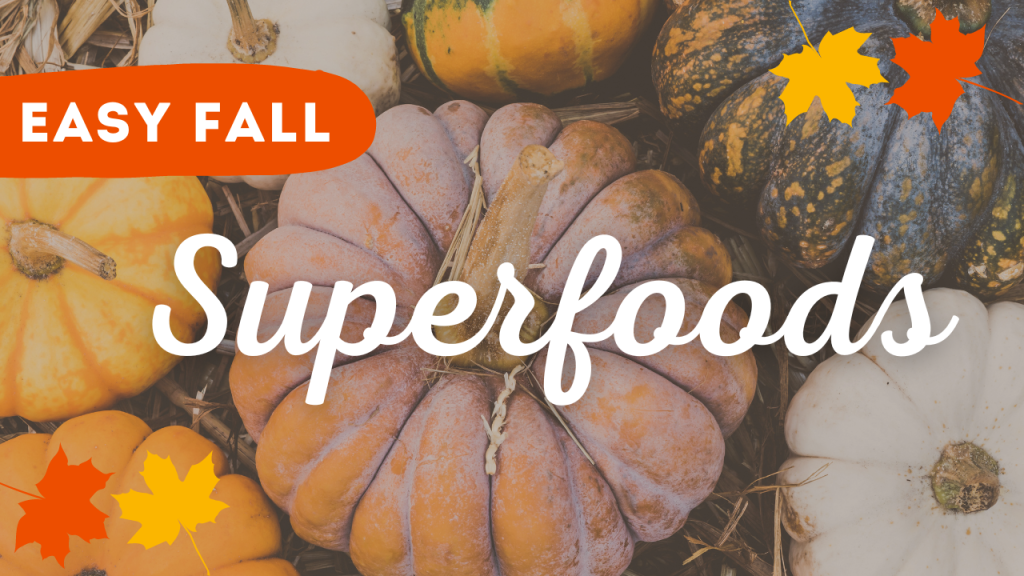What is a Superfood?
A superfood is just a marketing term for a food with exceptional nutrient density. Many believe that superfoods are unusual like goji berries, spirulina and wheatgrass. But there are actually a wide variety of ‘more regular’ foods that fall under this category.
Why are superfoods important?
A diet consisting mostly of nutrient devoid processed foods are loaded with chemicals and can lead to inflammation in the body as well as increase your risk of developing chronic health conditions.
Eating a variety of nutrient-dense foods, loaded with vitamins, minerals is a great way to protect your body and decrease the risk of contracting preventable diseases.
6 Fall Superfoods
- Cranberries
Loaded with antioxidants that reduce inflammation, lower risk of urinary tract infections, improve immune function and decrease blood pressure. Plus, they’re a great source of fibre that can boost digestion.
Avoid dried cranberries because they are naturally high in sugar, instead try fresh or frozen sugar-free and add them to smoothies. Or, if having cranberries with your turkey dinner this Fall or Winter look for a recipe that doesn’t contain any processed sugar like this one from Cookie and Kate
- Squash
Any kind of squash, (acorn, butternut, pumpkin, delicata,…), all are a great source of beta-carotene, which gets converted in the body to immune enhancing Vitamin A. Also, very important for eye and skin health.
Squash is way more versatile than you might think –simply cut in half and roast in the oven, serve in power bowls or alongside almost any meat dish. For the more adventurous check out the many recipes online for squash muffins, soups and pasta sauces.
- Sweet potatoes
Sweet potatoes are a great source of dietary fibre, which aids in digestion and help to maintain balance of gut bacteria. They’re loaded with antioxidants which can reduce the risk of cancer.
Sweet potatoes are healthiest when you leave the skin on. Try baking them and enjoy them with a little grass-fed butter, salt and pepper. Or mash them and serve alongside almost any dish.
- Brussel sprouts
As with all cruciferous vegetables, Brussel sprouts are loaded with Vitamin C which can help with immunity and tissue repair. They also contain Vitamin K to aid in blood clot formation, bone health, cardiovascular health, it’s anticancer and insulin-sensitizing (T2 Diabetes).
- Apples
Like they say, ‘An apple a day keeps the doctor away!”. Apples are a good source of antioxidant Vitamins C, E, and polyphenols as a well as being a great source of fibre, especially when you leave the skin on. This fiber aids in digestion and supports a healthy balance of gut microbes.
An apple is a quick and convenient snack, but also can be baked with a little cinnamon and good quality raw honey or maple syrup – DELICIOUS!5. Brussels sprouts
- Pomegranates
These juicy tart seeds (arils) are loaded with antioxidants that help support heart health and lower inflammation. Pomegranates are also high in fiber.
There are several gadgets that help make pomegranate eating a little easier – sometimes available wherever you’d find pomegranates. Sprinkle them on oatmeal, soups and salads, or eat them as is.
The Scoop on Superfoods
Try not to focus on the latest trend with superfoods. Aim for a wide-variety of colour on your plate that way you can be sure you’re reaping their many health benefits.
REFERENCES
https://www.ncbi.nlm.nih.gov/pmc/articles/PMC10058108/
https://pubmed.ncbi.nlm.nih.gov/31909777/
https://www.ncbi.nlm.nih.gov/pmc/articles/PMC5624454/
https://www.ncbi.nlm.nih.gov/pmc/articles/PMC4600246/

